More than 80% of respondents in six countries believe climate change has affected food and water security, as well as the cost of living
Dentsu Inc. (President & CEO: Norihiro Kuretani; Head Office: Tokyo) announced today the results of its Sustainable Lifestyle Receptivity Survey 2023. The poll was jointly conducted with the Dentsu Institute (Director: Hidemi Matsuo), a dentsu Japan organization, in six countries (Japan, China, France, Germany, Indonesia, and Thailand) between July 12 and August 21, 2023, collecting replies from 6,000 respondents (1,000 people in each country) between the ages of 18 and 69.
First conducted in 2010, again in 2021, and then once more this year, the survey allowed for an international comparison to be made between the latest and previous survey results about people's receptivity to sustainability-related issues and changes in their behaviors, at a time when the world is confronting challenges such as climate change, wars, and rising prices.
The key findings of the survey are presented below.
Key Findings
- Over 80% of respondents in the six countries surveyed believe food and water security, as well as the cost of living, have been affected by climate change.
- The issue of greatest concern for most respondents in Japan is natural disasters; in France, food waste; in Germany, ocean plastic waste; and in China, Indonesia, and Thailand, air pollution.
Compared with the previous survey conducted in 2021, more respondents in Japan are concerned about electricity and energy issues, the food self-sufficiency rate, as well as conflicts and war. - More than 80% of respondents in China, Indonesia, and Thailand answered that they have been thinking about sustainability more frequently over the past three years.
- Less than 60% of respondents in all six countries have indicated that sustainable options for "food and beverages," and "household essentials" are available at reasonable prices.
- Over 80% of respondents in the six countries believe that food prices have risen, and over 70% of respondents believe that more eco-conscious and socially responsible product options are available.
Note: The composition ratios presented in this press release have been rounded to the nearest unit. Consequently, some totals do not match the sum of the data components given in the tables.
Details of Findings
- Over 80% of respondents in the six countries surveyed believe food and water security, as well as the cost of living, have been affected by climate change.
- As shown below in Chart 1, the top responses for items affected by climate change (either "strongly affected" or "somewhat affected") chosen by respondents were "food and water security" at 84.2%, and "cost of living" at 84.0%.
Chart 1.
Responses to the question, "To what extent do you believe climate change has affected the following items?"
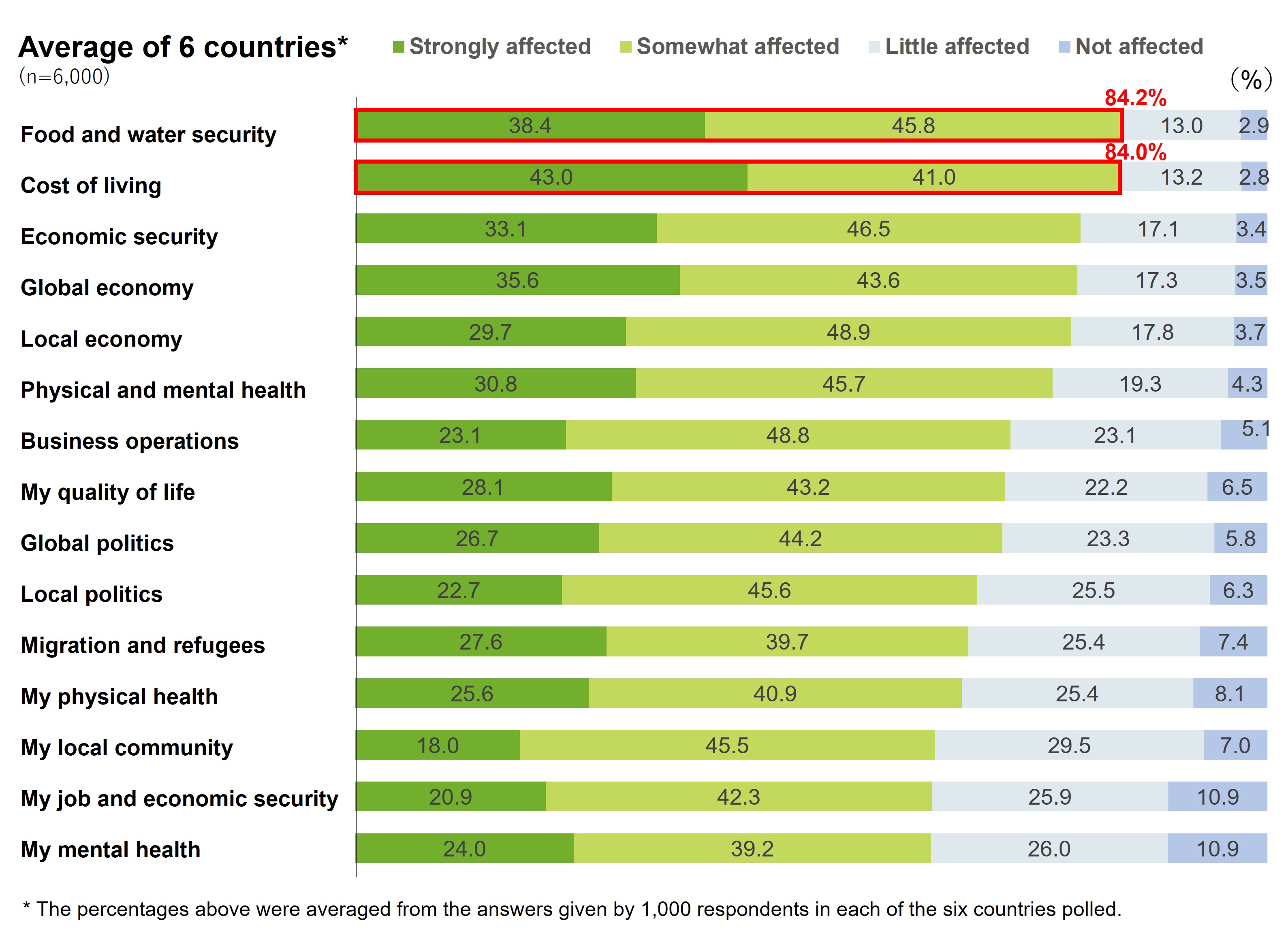
- The issue of greatest concern for most respondents in Japan is natural disasters; in France, food waste; in Germany, ocean plastic waste; and in China, Indonesia, and Thailand, air pollution.
Compared with the previous survey conducted in 2021, more respondents in Japan are concerned about electricity and energy issues, the food self-sufficiency rate, as well as conflicts and war.
- By country, the issues of greatest concern for respondents (see Chart 2) were: in Japan, natural disasters, at 47.9%; in France, food waste, at 61.9%; in Germany, ocean plastic waste, at 61.2%; and in China, Indonesia, and Thailand, air pollution, at 60.9%, 64.5%, and 70.6%, respectively.
- Compared with results of the previous survey conducted in July 2021, the 2023 survey reveals an increase in the percentage of respondents in Japan concerned about electricity and energy issues, up 7.2 percentage points; the food sufficiency rate, up 6.2 percentage points; as well as conflicts and war, up 4.7 percentage points (see Chart 3).
Chart 2.
Responses to the question, "Which of the following issues are you concerned about? (Multiple responses are allowed.)"
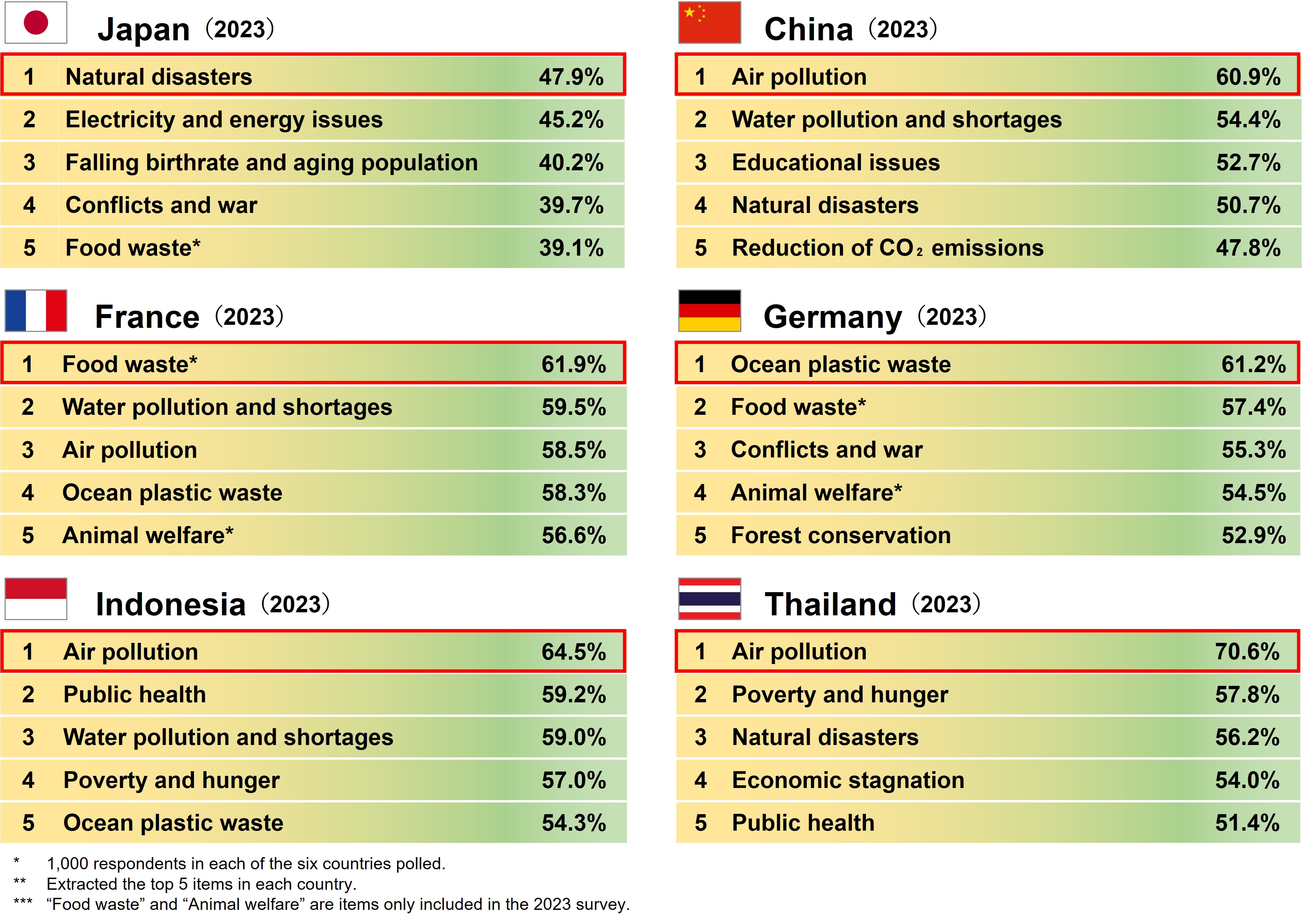
Chart 3.
Responses to the question, "Which of the following issues are you concerned about? (Multiple responses are allowed.)"
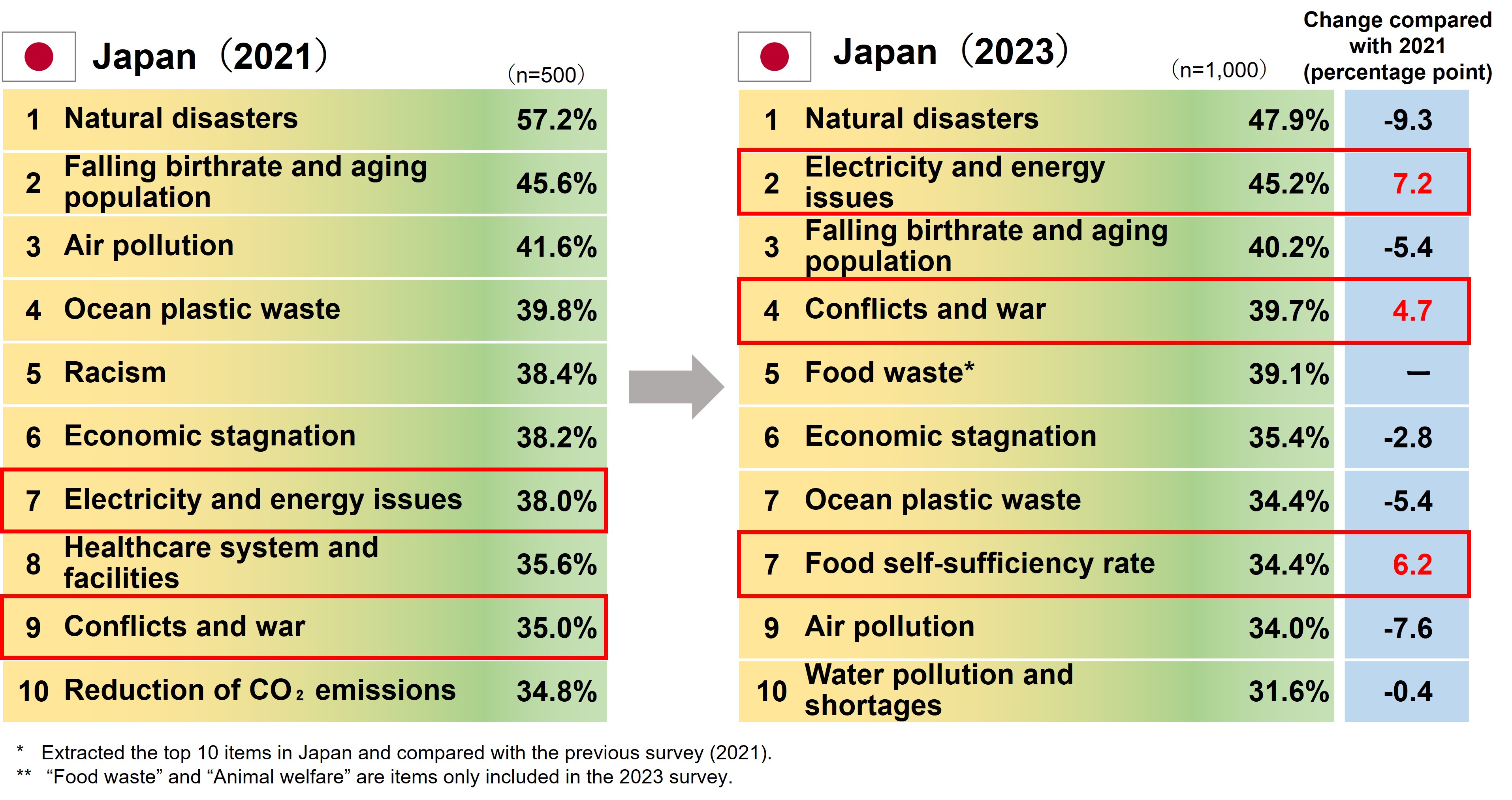
- More than 80% of respondents in China, Indonesia, and Thailand answered that they have been thinking about sustainability more frequently over the past three years.
- Those surveyed were asked whether there was a change in how frequently they had thought about sustainability during the three years from 2020 to 2023. The percentage of respondents reporting a greater frequency (see Chart 4), i.e., that the frequency had "significantly increased" or "somewhat increased," was highest for China at 84.1%; followed by 81.5% for Indonesia; 80.9% for Thailand; 66.9% for France; 64.0% for Germany; and 39.3% for Japan. Those responding that the frequency had "stayed the same" was highest for Japan at 58.8%.
Chart 4.
Responses to the question, "Has the number of times you think about sustainability changed during the past three years?"
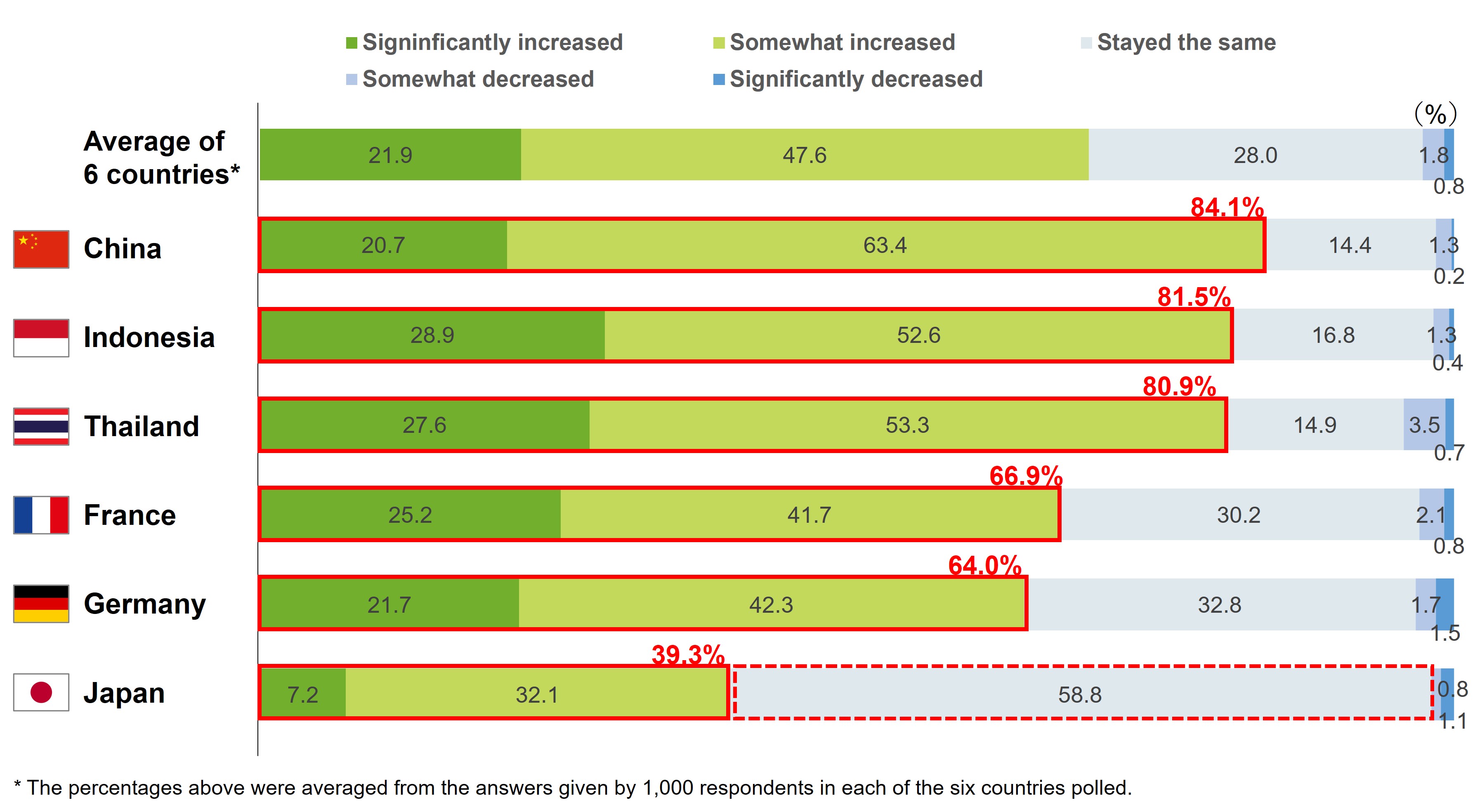
- Less than 60% of respondents in all six countries have indicated that sustainable options for "food and beverages," and "household essentials" are available at reasonable prices.
- The survey respondents were asked about the availability of sustainable options when purchasing various categories of products and services. The percentage of respondents in the six countries who feel that sustainable options are available at reasonable prices (see Chart 5) was highest for the category of "food and beverages" at 59.1%, followed by "household essentials" at 58.5%, and "dining" at 50.3%. Respondents indicating that sustainable options come at a premium cost, which they cannot afford, is highest for the category of "real estate" at 45.8%, followed by "auto" and "luxury" at 44.8% and 43.8%, respectively.
Chart 5.
Responses to the question, "To what extent are sustainable options available to you when purchasing each of the following categories of products and services?"
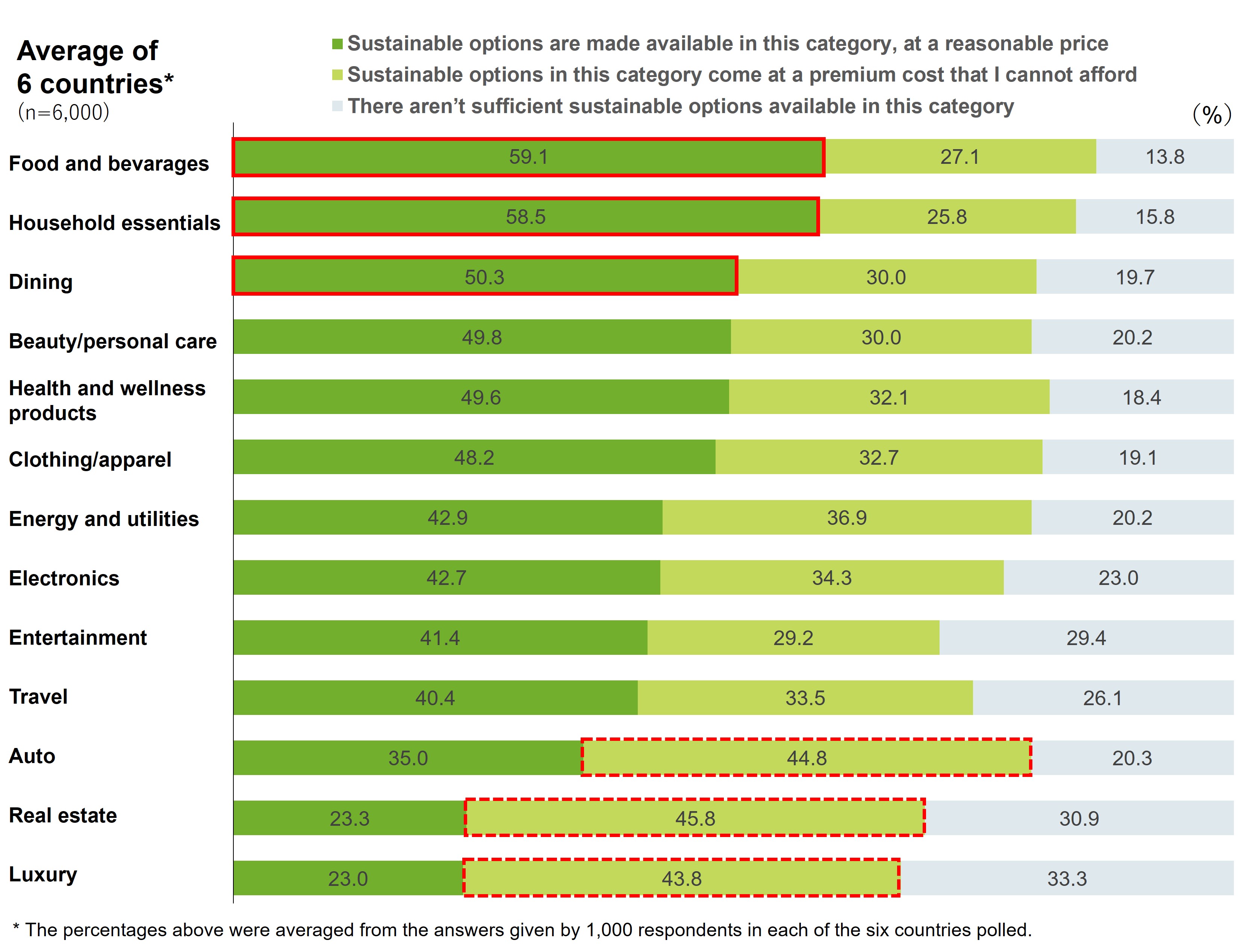
- Over 80% of respondents in the six countries believe that food prices have risen, and over 70% of respondents believe that more eco-conscious and socially responsible product options are available.
- In total, 87.5% of all respondents either "agreed" or "somewhat agreed" that food prices have risen in 2023 (see Chart 6). Percentages were highest among respondents in Germany at 92.7%, followed by Japan at 91.2%, France at 90.9%, Thailand at 86.9%, China at 82.8%, and Indonesia at 80.5%.
- As shown in Chart 7 below, 74.4% of all respondents either "agreed" or "somewhat agreed" that the availability of eco-conscious and socially responsible product options has increased. Percentages were highest among respondents in China, at 90.2%; followed by Thailand, at 88.7%; Indonesia, at 87.1%; France, at 64.8%; Germany, at 63.2%; and Japan, at 52.5%.
Chart 6.
Responses to the question, "To what extend do you agree or disagree with the following statement regarding products and brands in 2023?"
Food prices have risen.
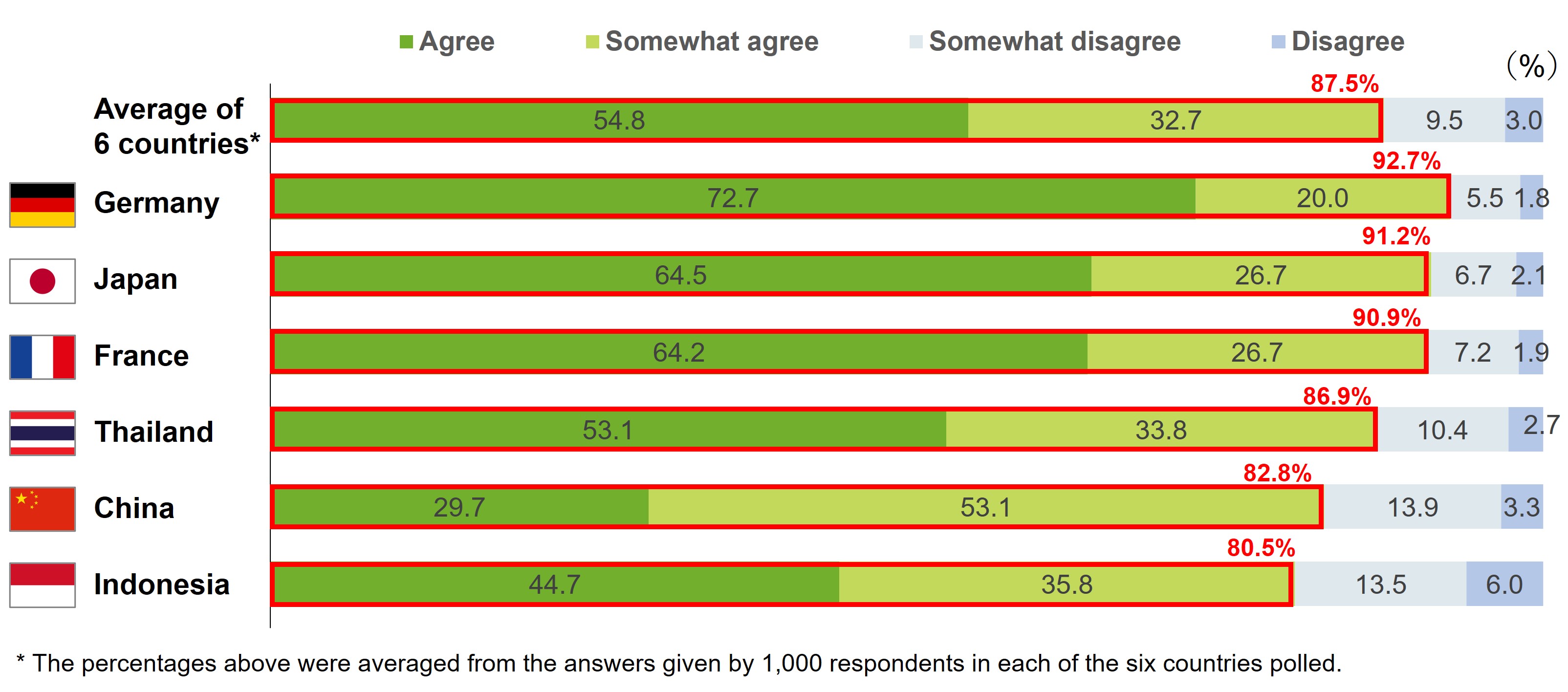
Chart 7.
Responses to the question, "To what extend do you agree or disagree with the following statement regarding products and brands in 2023?"
Eco-conscious and socially responsible product options have increased.
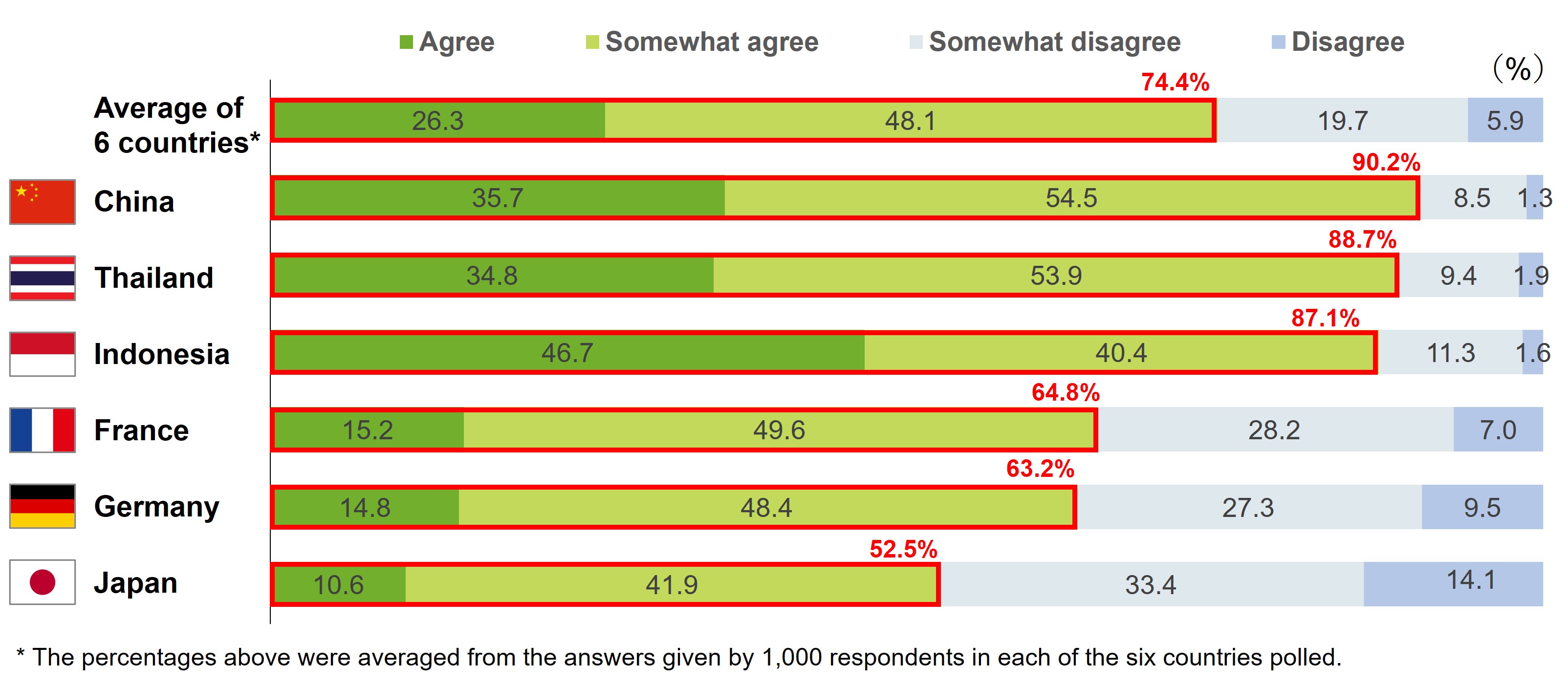
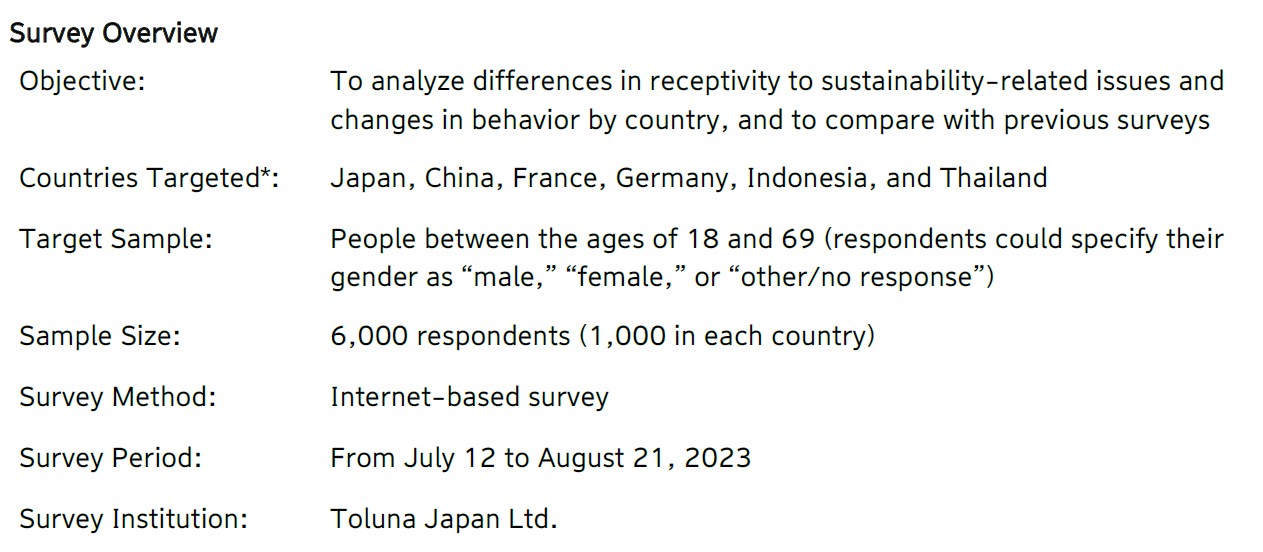
* Consumers in the US and Canada were asked similar questions in a survey conducted by dentsu in June 2023. The poll was published under the title, Dentsu Consumer Navigator: Sustainability 2023.
About dentsu Japan
Out of dentsu's four global business regions, dentsu Japan oversees and supports the Japan business, which includes the world's largest single brand agency, Dentsu Inc., in addition to representing the Japanese business brand.
The approximately 22,000 professionals supporting the brand integrate AX (Sophisticated advertising communications), BX (Overall business transformation), CX (Customer experience transformation), and DX (Marketing infrastructure transformation) solutions to maximize provided value.
As an Integrated Growth Partner, dentsu Japan will contribute to the growth of client companies and the sustainable development of society.
Links to Press Releases, Reports on Previous Surveys
Sustainable Lifestyle Receptivity Survey (conducted between March and November 2010; results announced on June 7, 2011)
- Press release: https://www.dentsu.co.jp/en/news/release/pdf-cms/2011064-0607.pdf
- Report (Japanese language only ): https://www.dentsu.co.jp/news/item-cms/SustainableLifestyleReport2011.pdf
Sustainable Lifestyle Receptivity Survey 2021* (conducted between July 8 and July 20, 2021; results announced on September 8, 2021)
- Press release: https://www.dentsu.co.jp/en/news/release/2021/0908-010440.html
- Report:https://qosen.dentsusoken.com/articles/262/
* The survey was conducted in July 2021 in 12 countries. There were 500 respondents each in Japan, Germany, the UK, the US, China, and India; as well as 300 respondents each in Indonesia, Malaysia, the Philippines, Singapore, Thailand, and Vietnam. After the press release had been published, the survey was conducted in Sweden, Australia, Brazil, and South Korea, with 500 respondents in each country. The results were presented in a 2021 report.
#####
Contact
Media-related inquiries:
Corporate Communications Office, Dentsu Corporate One Inc.
Email: global.communications@dentsu.co.jp
Survey-related inquiries:
Sustainability Consulting Office, Global Business Center, Dentsu Inc.
Email: sus.consult@dentsu.co.jp
